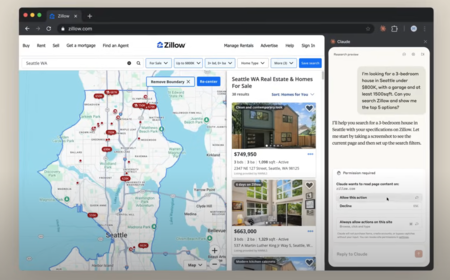Do you remember what was the first web browser What did you use? Whatever your answer, the truth is that, essentially, the way to use them has not changed too much since the time of Netscape Navigator.
Yes, over the years, browsers have lived deep transformations. At the beginning they endured flat pages, almost like a digital newspaper, and today they carry websites full of photos and videos on their backs. It was they who brought us the eyelashes, who changed forever the way of organizing what we had open.
Security was also consolidated with the https padlock, the responsive design that allowed the website to be taken to the mobile without losing usability and more. All this was marking important stages, but the truth is that, essentially, we never stopped Enter, write, click and handle the pages ourselves.
Advances there were many, but the interaction remained the same
That dynamic, however, could be about to transform. And there are weight reasons to think that it will be. The technology industry has focused on automation, in a scenario where AI agents assume a good part of heavy work.
These systems aim to be capable of:
- Plan and divide complex tasks into logical steps.
- Choose the best tools to meet what they are asked.
- Have memory and context to meet the user and offer more tight solutions.
Imagine agents capable of managing tasks from beginning to end. From Organize a trip With hotels and flight reservations at the best Price, until the weekly purchase, create spreadsheets or handle specialized software.
It would be enough to give them instructions (and the appropriate permits) to act in our name and consult us only when necessary: confirm a purchase, choose an option or solve a problem in the process.
The interaction with them would be direct: text in a chat window or, better yet, the voice. Nothing to fight again with menus, forms or traditional interfaces of pages and web programs.
The truth is that we are already seeing steps in that direction. Perplexity has a comet, an AI browser Execute tasks on the username. Openai presented Operator, then integrated into the chatgpt agent mode with its own browser.

Claude’s extension for Chrome in Action
Anthropic, on the other hand, has entered the race with an extension of Claude capable of controlling Chrome, while Google develops Project Astra, an agentic system that goes beyond the browser and can operate directly on Android devices.
For now, most of these proposals are in an experimental phase and with limited deployment. But it would not be strange that, as quickly as the sector progresses, they soon become a new way of interacting with the web.


Comet, the agentic browser of Perplexity
Just remember how we worked before November 30, 2022, when Chatgpt did not exist yet. Barely two years and eight months latertechnology has radically changed the panorama.
Of course, not everything is promises. One of the biggest challenges of browser agents is security. And here the edges are many.
Nobody wants an agent who, for misunderstanding instructions, reserves a wrong flight or Buy something unnecessary. Neither do we want them to become Victims of cybercriminalswhich are already exploring ways to manipulate them just as before they tried to deceive us with phishing or scams.

Malicious instructions are a clear example: if a human can be deceived, you can also try to make an agent execute actions against us, such as revealing passwords or extracting sensitive information.
The question is inevitable:We are entering the era of artificial intelligence agents in the browser? Would you use them?
Images | WorldOfSoftware with Gemini 2.5
In WorldOfSoftware | If you don’t know why your Instagram has been filled with orcs and sharks, the answer is simple: a false video made with ia












